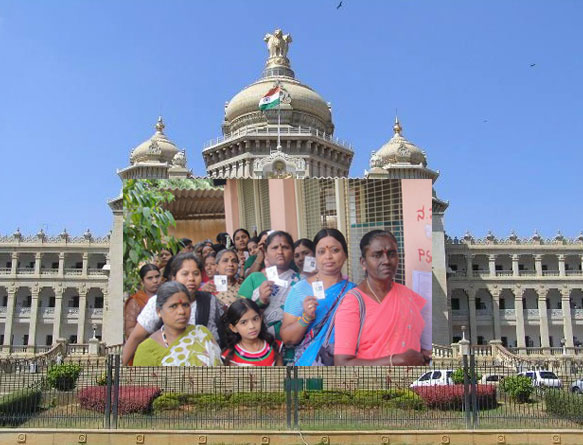(ND Shiva Kumar, TNN )
Congress Gives Tickets To 11 Women, JD(S) 8, BJP 7. All Cite Poor-Winnability Criteria For Poor Representation. But The Question Remains: Do All Male Candidates Who Contest Romp Home?
BANGALORE: The Congress, the BJP and the JD(S) may not have much in common, but they are united in their belief that women do not win elections. Hence, together, they have fielded a mere 26 candidates for the May 5 assembly elections.
Despite Sonia Gandhi being in charge, the Congress has given tickets to just 11 women, with JD(S) and BJP fielding eight and seven women candidates. The situation is eerily reminiscent of 2008, when BJP, JD(S) and BSP fielded 10 women each, while Congress went to the polls with 11 women candidates. Only six finally made it to the assembly.
Parties take refuge in this statistic. Women’s poor performance on the ‘winnability’ criterion is held as the main reason for their poor representation in politics.
Women contest this. Before Congress announced its list, a group of women leaders staged a dharna in front of the AICC office in New Delhi, demanding at least 10% of seats for women. They questioned the ‘winnability ‘ premise with ” Do all men who contest win?”
R Indira, professor of sociology, Mysore University, says: ” Winnability is not a personal merit, but depends on many factors. Unless backed by the family or the party, a woman can’t mobilize much money. She lacks big group backing and muscle power. Women have cultural priorities defined by the family. Patriarchal political systems do not tolerate them. Men do not favour redistribution of political power, hence block opportunities for women, be it at the organizational level or in the assembly or Parliament.”
Women today have 50% reservation in panchayats; gram panchayat, taluk panchayat, zilla panchayat and urban local bodies; corporations, city municipal councils, town municipal councils and town panchayats. But there is no upward mobility. A study has shown that chances for women to go from gram panchayat level to that of zilla panchayat is very less.
The discrimination doesn’t end here, but continues even after election of women. In the history of Karnataka , none has occupied the position of chief minister, deputy chief minister or home minister. And none of the parties has had a woman president so far.
The few women who are in politics invariably have a family connection. It’s mostly the wife, daughter or sister of a powerful politician who gets a break. Many times to milk a sympathy wave. JD(S) MLA Kalpana Siddaraju’s case clearly explains this. Though a sitting MLA, she has been denied a ticket by her party, which has chosen DC Thammanna.
Kalpana was earlier given a ticket following her husband MS Siddaraju’s death a few months after getting elected. She was thrust into the hurly-burly of politics to take advantage of the sympathy wave. When the leaders campaigned , a sad and teary Kalpana stood with her hands folded. She won. This time, she was denied a ticket because party bosses felt Thammanna is a more formidable candidate than her. Besides being ‘resourceful,’ he is also Deve Gowda’s relative.
Unfortunately, even those women who have secured party tickets aren’t happy. ” One party leader filed his nomination as a rebel candidate. He’s going to spoil my prospects. Isn’t it the responsibility of senior leaders to mediate and make him withdraw his candidature ? None of our leaders is even taking my calls. They have given me the ticket for namesake. If I lose, it’ll help them to shut me up completely,” rues a woman candidate from a national party.
What’s the way out? A Narayana, faculty with Azim Premji University, feels women’s leadership can grow if they get adequate opportunities at party forums and with reservation. ” Countries like Sweden, Denmark and Rwanda have quota for women. Many nations are talking of quota now. It’s time we had reservation for women, not 33% but 50%,” says Prof Indira.
THEY WERE BETTER OFF FIFTY YEARS AGO
The Constitution of India, in Articles 325 and 326, guarantees political equality to all men and women. The 225-member 13th Karnataka assembly has six women MLAs. Of the 28 MPs from the state, J Shantha is the lone woman.
Women were better off in 1950s and 1960s. Fifty years ago, they had respect, better representation in the assembly and stood a good chance of victory in the electoral battle. The highest number of women elected to the assembly so far, from 1957 to 2008, is 18 in 1962. In 1957, when there were 179 constituencies, 13 women got elected.

